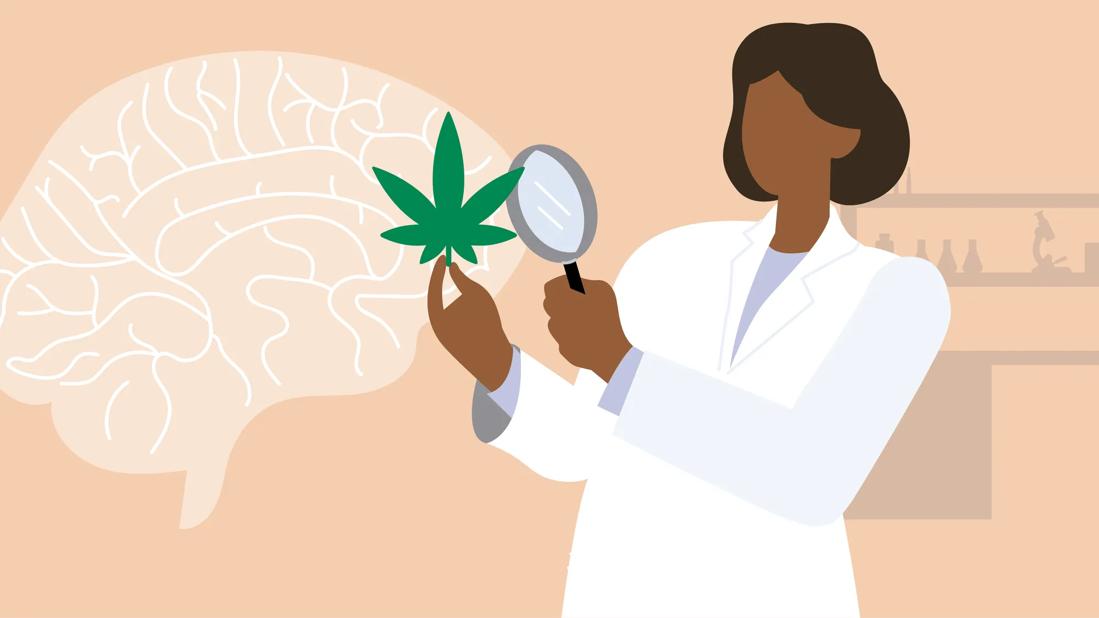Because of a lack of research and possible side effects, cannabis isn’t recommended to treat mental health disorders

Image content: This image is available to view online.
View image online (https://assets.clevelandclinic.org/transform/88a52c2b-7a16-44b3-9987-267045b889fb/doc-examines-marijuana-1492348454)
Healthcare provider examining marijuana leaf with a magnifying glass, with oversized brain in background
These days, it seems like everyone from celebrities to your next-door neighbor is talking about the positive results of marijuana on their mental health.
Advertisement
Cleveland Clinic is a non-profit academic medical center. Advertising on our site helps support our mission. We do not endorse non-Cleveland Clinic products or services. Policy
Because of this rise in cannabis’s reputation, you’ve also likely heard a story or two about medicinal marijuana or cannabis-derived products (like CBD) managing someone’s anxiety or depression.
And while medical marijuana has been studied and used for conditions like pain management and epilepsy, its effects on mental health aren’t yet well-researched.
Psychiatrist Brian Barnett, MD, says using medicinal marijuana, or related products, to treat mental health conditions can’t be justified based on current research. Here’s what you should know about the effects of cannabis on your mental health.
Maybe a friend of a friend or a post on social media says that cannabis can help manage mental health disorders. And while many pop culture references agree with this sentiment — that it’ll put you in a chill mood — the truth is, there’s still a lot we don’t know about this leafy drug.
In a 2019 review, scientists looked at 83 studies on medicinal marijuana, synthetic marijuana and marijuana-derived products. They studied the products’ impact on six mental health conditions:
Advertisement
The review found no compelling evidence for using any type of marijuana for mental health treatment. Dr. Barnett reiterates that additional research is needed to determine the full effectiveness of marijuana products to treat mental health problems.
We do know that cannabis does affect your mental state — but not in the ways you may be seeking in order to help manage symptoms. The short-term effects of marijuana include:
That’s right — the conditions you could be trying to manage with cannabis can actually be triggered by it’s use.
As Dr. Barnett points out, the 2019 study didn’t find much support for marijuana helping anxiety symptoms. “There was pretty low-grade evidence for marijuana for treatment of anxiety disorders,” he notes.
This lack of evidence, as well as the fact that cannabis can affect everyone differently, are some of the reasons healthcare providers are wary of recommending cannabis for anxiety. In some cases, cannabis has also been shown to increase feelings of anxiety, paranoia and panic attacks, especially with high-THC strains. It may also worsen symptoms in individuals with preexisting mental health conditions, such as depression, bipolar disorder and schizophrenia.
While there was a 2018 study that suggested a slight relief from anxiety and depression symptoms after cannabis use, the effects were only felt in the short term — and, in fact, in the long term, the data suggested that it may have made symptoms worse.
While there has been some emerging evidence suggesting that CBD could work as an anti-depressant, the use of marijuana or THC products for depression is another story.
Similar to its effects on anxiety, cannabis can have adverse effects when used for depression. For example, synthetic weed has been linked to cases of increased suicidal thoughts, violent behavior and psychosis. And a 2023 survey found that cannabis use was associated with major depressive disorder and suicidal ideation in young adolescents.
While we don’t yet know enough about the potential health benefits of cannabis, Dr. Barnett urges people to be aware of the known risks.
Memory problems, lung health and other issues should be considered when using products like this. Plus, contrary to popular belief, he also points out the increased risk of addiction associated with cannabis.
“We’ve seen increases in the numbers of individuals coming to the emergency room as marijuana is becoming legalized in various contexts,” he continues. “We also know marijuana is becoming stronger in terms of THC content than it was in the past, which can make for more adverse reactions.”
Advertisement
Dr. Barnett adds that it’s important to talk to a healthcare provider before self-treating with marijuana or products derived from marijuana, as there are certain conditions and medications it can interact with.
And if you’re experiencing symptoms of anxiety or depression, your best option for getting help is to speak with your healthcare provider about the many more well-studied and successful ways to treat these conditions.
Advertisement

Sign up for our Health Essentials emails for expert guidance on nutrition, fitness, sleep, skin care and more.
Learn more about our editorial process.
Advertisement
Sellers call it ‘light weed,’ but the health effects and safety are largely unknown
These recently popular drinks claim to relieve anxiety and stress, but more research is needed
Legality, toxicity and effectiveness are all ongoing concerns
Changing habits takes time and commitment
Synthetic isn’t always safer
Studies suggest CBD has wide-ranging benefits, but there’s a catch or two
An expert gives the latest updates about ongoing research
Pot may seem harmless, but it’s not to your baby
Although it could be used as a moisturizer, this new trend is not recommended
Communicating clear limits helps protect your time, energy and emotional well-being
High cholesterol can be genetic, but testing and treatment can lower your heart disease risk